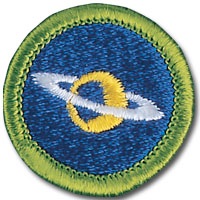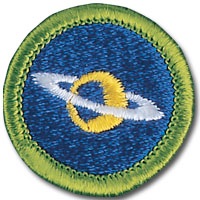Astronomy Merit Badge






Astronomy Merit Badge Supplementals
(updated Sat. Nov. 23, 2019)
The Astronomy merit badge requirements are listed at:
http://meritbadge.org/wiki/index.php/Astronomy,
which shares:
“In learning about astronomy, Scouts study how
activities in space affect our own planet and bear
witness to the wonders of the night sky: the nebulae, or giant clouds of gas and dust where new stars are born; old stars dying and exploding; meteor showers and shooting stars; the moon, plants and a dazzling array of stars.”

The purposes of this pages share some additional “fun facts” about Astronomy.
This page is fully separate from the Merit Badge requirements and none of these “fun facts” are needed to complete the Merit Badge, but hopefully all of them demonstrate some other reasons why Astronomy is so interesting.

On November 11, 2019, a meteor streaked across the St. Louis sky, moving almost directly east-to-west.
As I passed, it disintegrated.
KMOX provided a good report, and their page includes links to several videos of the meteor: https://kmox.radio.com/articles/news/meteor-lights-st-louis-city-skyline-and-arch.
“ST. LOUIS (KMOX) - Residents from Highland, Illinois to St. Charles, MO, reported a bright flash across the sky followed by two loud booms Monday evening as a meteor lit up the night just before 9pm.
The meteor streaked across St. Louis skies and waas [sic] caught by several cameras around the area.
WATCH: meteor lights up the skyline of St. Louis.”
Perhaps the best images came from the Gateway Arch’s webcam, which is located across the river, at the Malcolm W. Martin Memorial Park.
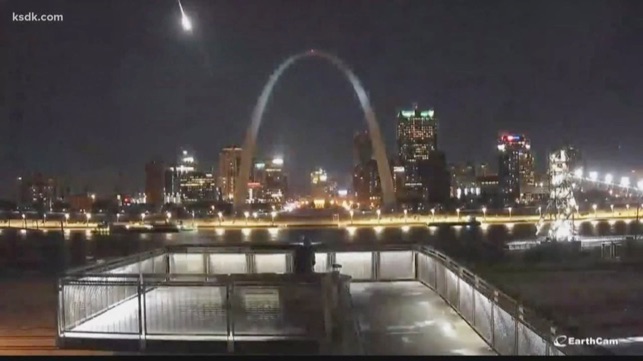

Astronomy Merit Badge Requirement 7 focuses on our Sun.
Bob Berman writes for Astronomy Magazine, publishes his own blog - http://skymanbob.com, leads astronomy tours, and also authors many books.
Mr. Berman has written a book called “The Sun’s Heartbeat, And Other Stories From the Life of the Star That Powers Our Planet.”

In “The Sun’s Heartbeat...” Mr. Berman presents many interesting facts and provides
insights into the people / scientists who have helped us
understand what we know about the sun.
You can buy it or check it out from our
Mr. Berman presents many interesting sun / solar facts
on pp 257 - 258 of “The Sun’s Heartbeat:”




For fun...
The following are not required for the Astronomy Merit Badge, but since they are interesting facts, and since they were mentioned, some at least only briefly, at our 2013 STEM-U and 2014 STEM U, I share them here.
Relating to the sun’s composition, October, 2014 issue of Astronomy Magazine shares the composition of our own Earth atmosphere:

Astronomy Magazine provides this view of distances to near stars in their August, 2013 issue:
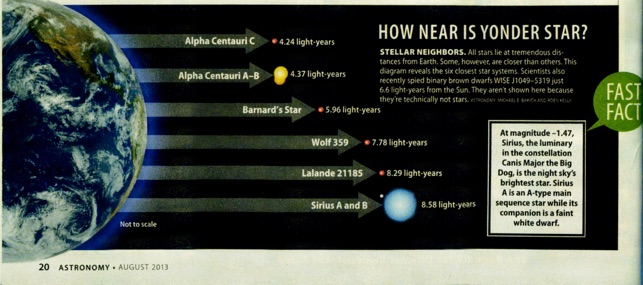
Astronomy Magazine provides these visual and text-based space rock definitions in their August, 2013 issue:
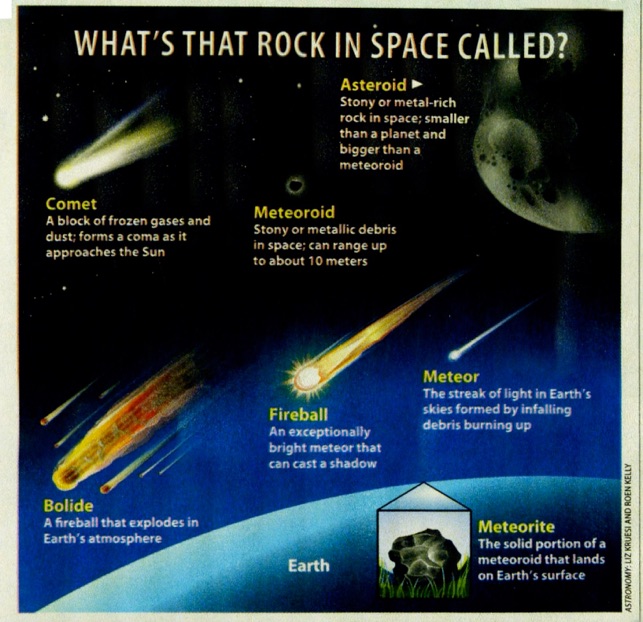
Astronomy Magazine provides perspective of astronomical distances in their July, 2013 issue:

Astronomy Magazine provides this perspective on the Earth’s motion around the sun in its November, 2013 issue:

Astronomy Magazine provides these insights into:
-
1)our Milky Way’s black hole
-
2)sunrises around our solar system
-
3)how the earth’s axis tilt impacts the sun’s rays, creating our seasons
in its May, 2014 issue:
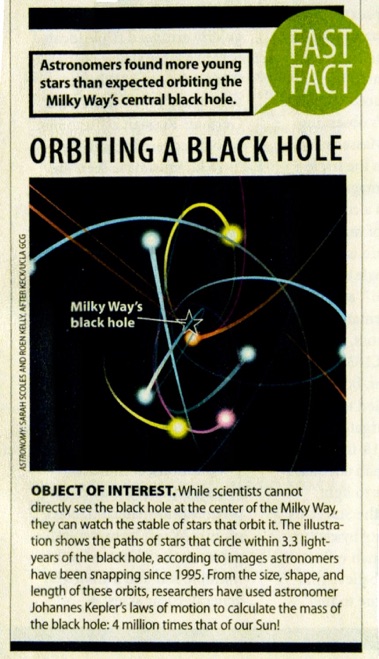
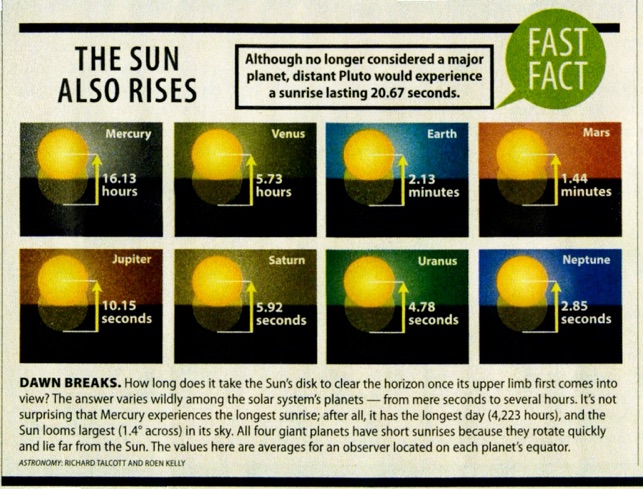
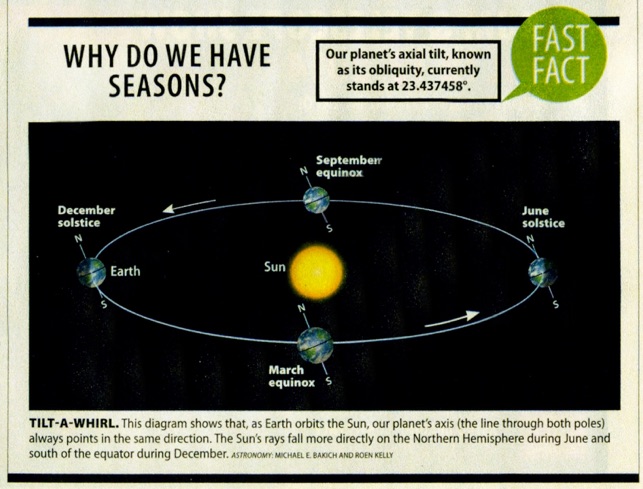
Astronomy Magazine provides these insights into:
-
1)perspectives on cosmic distances
-
2)how Sirius, the brightest start in our sky, is a binary, and how its two stars move in relation to one another
-
3)relative altitudes of our atmosphere and how much solar radiation gets through each layer
in its June, 2014 issue:
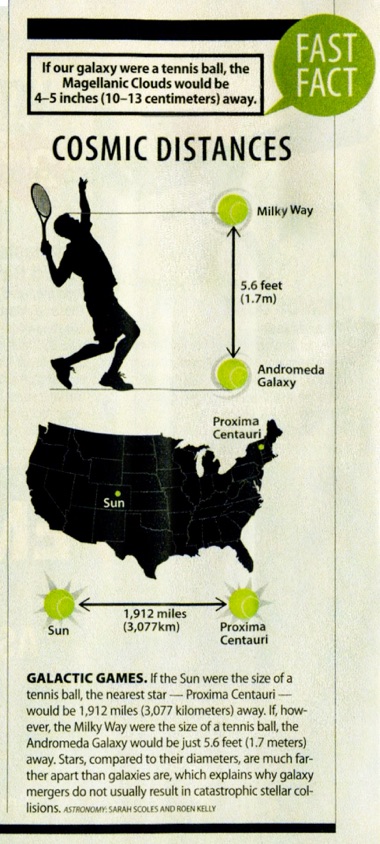
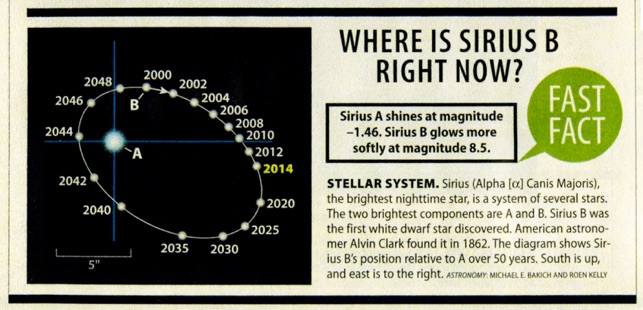
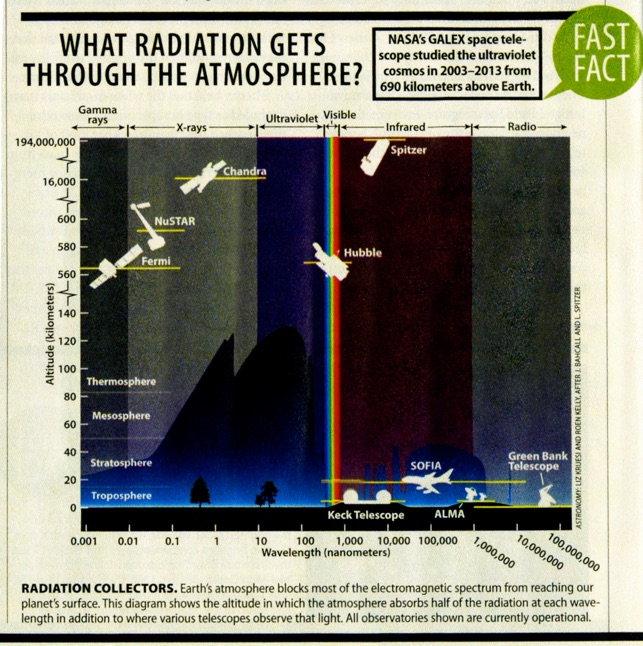
“The Tiniest Galaxy in the Universe”
Discover Magazine’s #90 Top 100 Stories of 2013
http://discovermagazine.com/2014/jan-feb/90-the-tiniest-galaxy-in-the-universe#.UusyEf0Ze7q
Some amazing images of the sky over our great state, taken and shared by Dan Bush, who lives in Albany, MO, which is about an hour northeast of St. Joseph -
http://www.missouriskies.org .
And, in conclusion...
Re: 4b... the Andromeda Galaxy will one day collide with ours
a computer simulation of what will happen 2.5+ billion years from now can be found via:
https://www.youtube.com/playlist?list=PL432C1F3DB4E069C6
which links to:
https://www.youtube.com/watch?v=Cd9cBlvfjow&list=PL432C1F3DB4E069C6&index=1



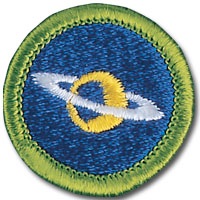
These are all of the links to the Astronomy Merit Badge pages:
Astronomy Merit Badge - Extra “Fun Facts”
Astronomy - Great American Eclipse
Astronomy - Great American Eclipse 2017

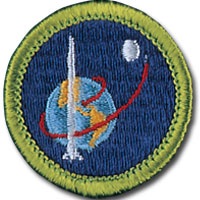
These are all of the links to the Space Exploration Merit Badge pages:
New Horizons - Mission Overview
New Horizons - Pluto Resources


The images from Mr. Berman’s “Secrets of the Night Sky...” and Outdoor Photographer were scanned directly from the book using the Halo Scanner Mouse - http://shop.halo2cloud.com/collections/computer-and-backup/products/scanner-mouse, which I received as a Christmas present from my mother in 2013.



Regardless your desire to pursue an astronomical career, it is hoped that you learned enough about astronomy through this merit badge to at least be interested to continuously look up at the sky in awe and wonder. If you pursue with enthusiastic interest, that’s great. If you do make a career in the field, GREAT.
May you be better off having completed your Astronomy Merit Badge than you were before you started.
